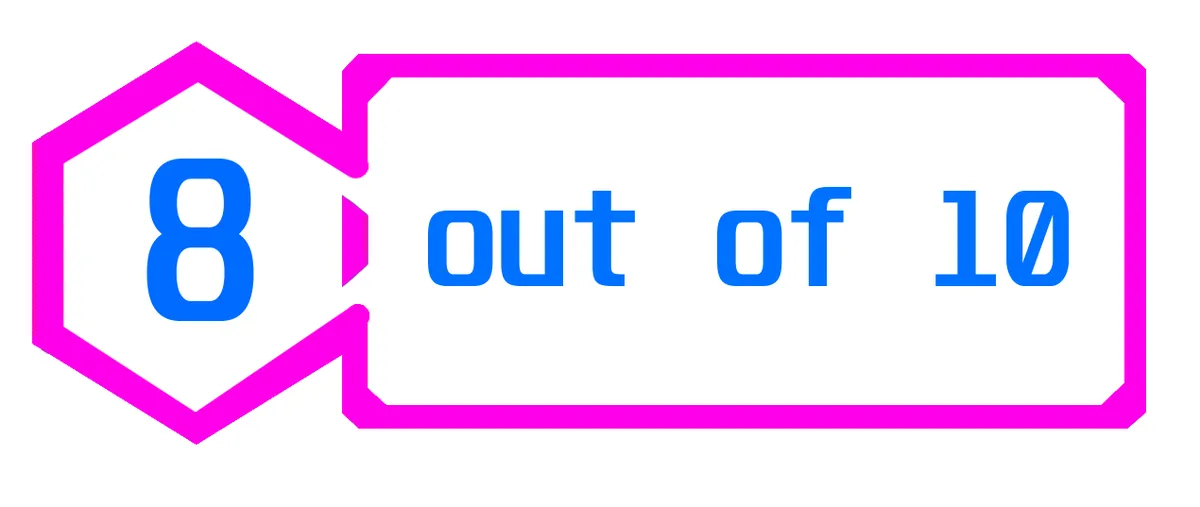Eternal Strands REVIEW - teamwork makes the dream work
Rhianne Ward
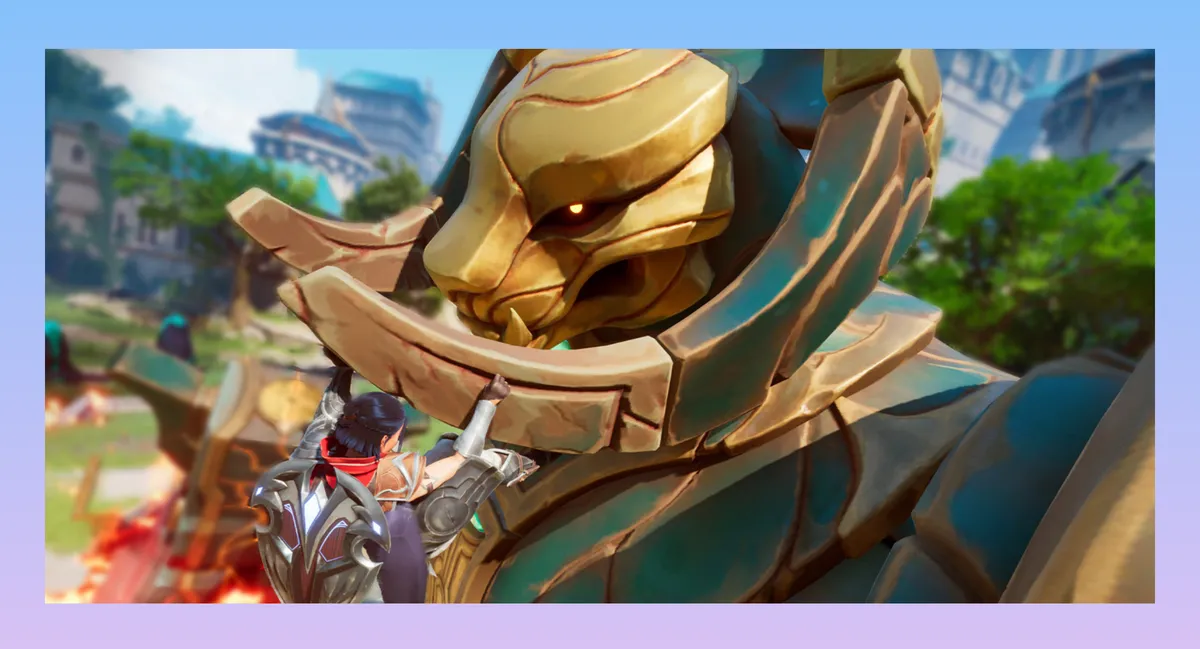
The conversation around games influencing one another has always been an interesting one to me. By default, all games are an offshoot of other games. Pong is an electronic interpretation of table tennis, for example. It is inescapable. All art comes from somewhere.
But I think there's a difference between inspiration and regurgitation, and you can usually feel it in the bones of the thing. You get a lot of cynical corporate rehashing of ideas and concepts, and a prioritising of trend chasing over genuine creative interest in an idea. Others have a lot of clear admiration for certain games, and incorporate them into their work, to sometimes uninteresting effect. A game is no good without a soul, and when you wear your influences too heavily on your sleeve, it can be difficult to convince the player that one is present.
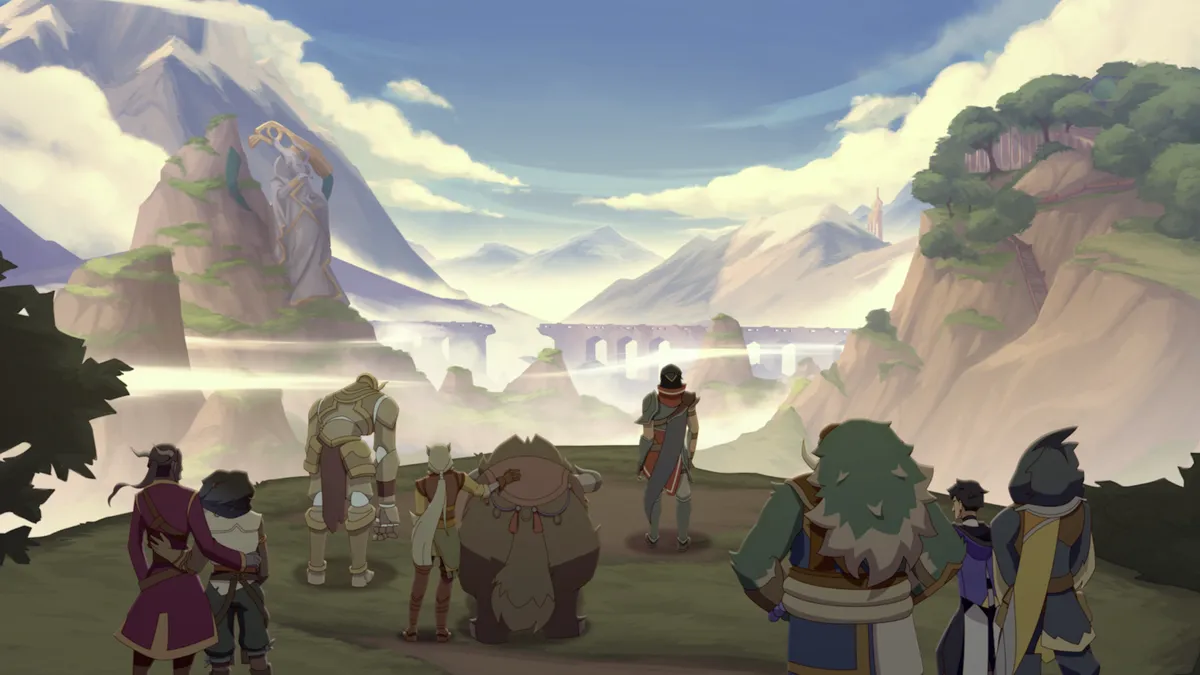
Then you have a game like Eternal Strands. The first hour was an exercise in creating a comprehensive mental list of every game I was reminded of while playing Eternal Strands. The most obvious point of comparison right off the bat was Dragon Age, with its cast of colourful characters hailing from various fantasy races and creeds. Knowing that the game's creative director Mike Laidlaw previously worked on Dragon Age: Origins in the same role, I wasn't particularly surprised by that.
Then, once gameplay began, I was thinking about Breath of the Wild, with its stamina system and protagonist’s ability to climb anything. Not to mention, there's an elements system in here - ice and fire - which has an effect on enemy ability as well as terrain. It being mainly expressed through spells is pretty novel, I'll admit.
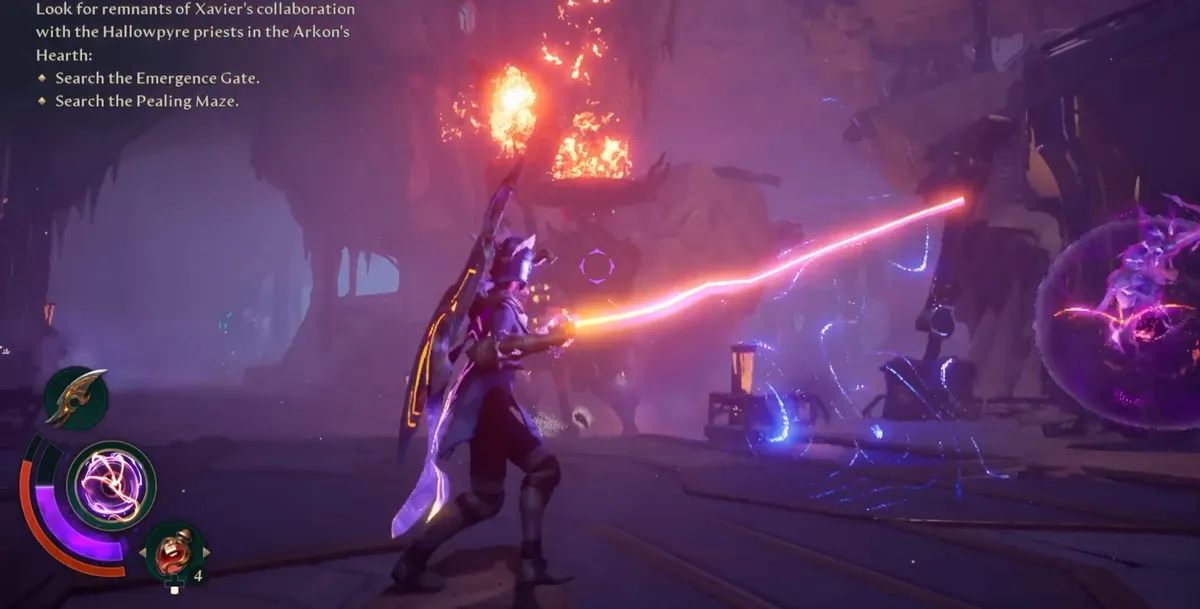
Once through the intro, and the game opens up into its open areas, I was remembering Dragon’s Dogma, a suspicion that became all the more clear once I came across my first epic enemy encounter and had to literally scale it to take out specific areas on its body (Shadow of the Colossus also came to mind in these moments, especially since the enemy in question was a man-made statue-esque construct, like the Colossi).
After that, you find out about the expedition system of heading out, making incremental progress through the world, then reporting back to a hub area to chat with your companions. Hades. Then I found out the only way to reap very specific materials from the big enemies was through a very specific process that required patience and a clear understanding of attack patterns and weaknesses to pull off. Monster Hunter. Later on, you explore a grand, but abandoned, city, often by hopping around on rooftops, surveying your surroundings, then getting into the guts of the alleyways and streets. Elden Ring, specifically Leyndell.
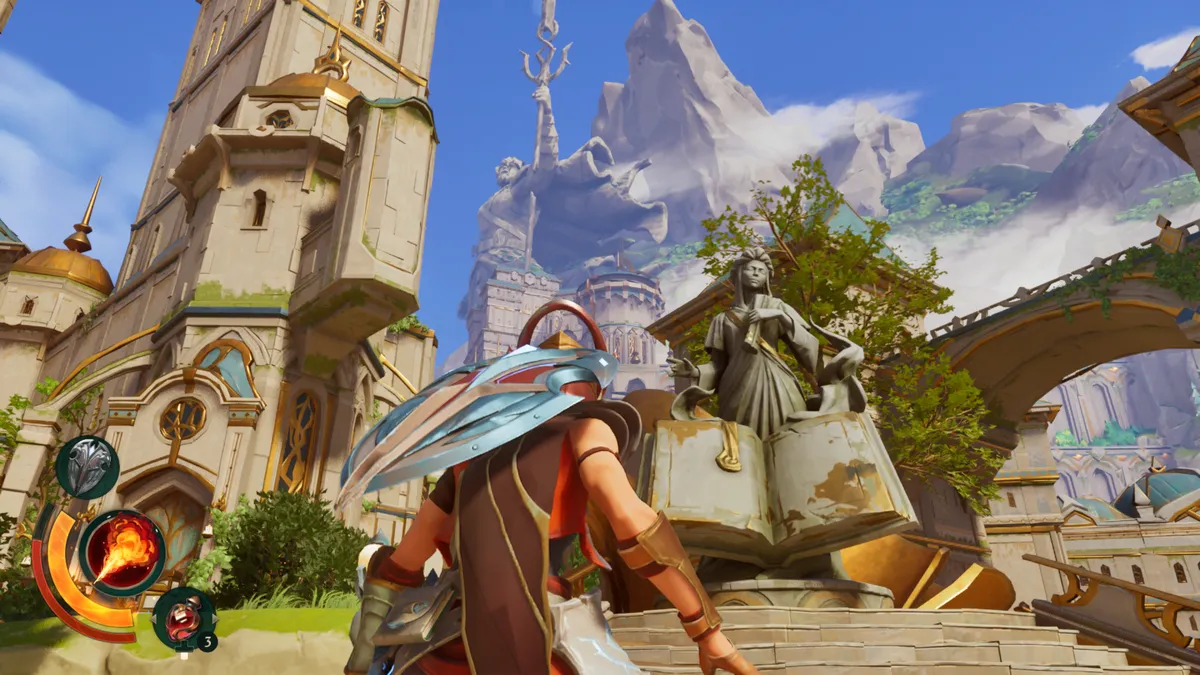
This just kept happening, all the time, for the first good while playing Eternal Strands. I was definitely having fun with the game, but it took a while to convince me of its own voice. Its soul. Then, at a certain point, I had a thought. If you are so blatantly influenced by so many other games, at what point does it just become a new experience entirely? How many Inspirations does it take before you're just making a new thing? I'll admit, a combination of Hades, Dragon Age and Shadow of the Colossus is not what would come immediately to my mind, but I know how because of Eternal Strands that it is a winning mix.
I do think, however, that this is Eternal Strands’ biggest hurdle initially. I imagine a lot of people will get a certain way in before conceding to the likelihood that this game is a trend chaser, trying everything that works in other games, hoping something sticks and makes it a smash hit. However, to fall for this doubt is to miss out on the magic of this game, because it is truly magical. I played this game for 35 hours, far longer than I had both expected or planned, and by the end of the postgame, I was genuinely saddened to see it go.
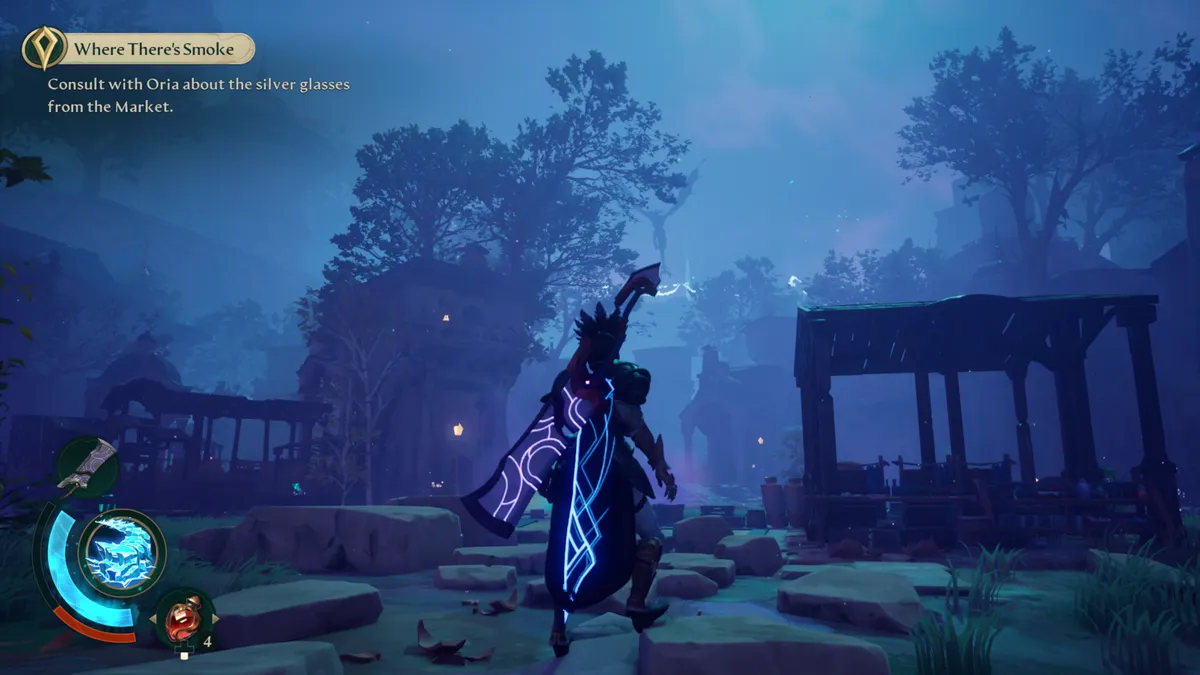
The world of Eternal Strands is utterly fascinating. The story takes place on a continent called the Mayda, where a magical disaster multiple decades prior has caused magic to be stigmatised everywhere. Those with the power - Weavers, they're called - often end up on the road, in Weavebands, unable to settle down due to their persecution. You are Brynn, a weaver fairly new to her Weaveband run by Oria, a famed point (leader) in search of a way in to the Enclave, the magic capital from where the disaster originated. Through a series of lucky breaks, you and the gang make it into the Enclave, the first in decades, but are subsequently trapped behind its magical barrier. As such, the only way to go is through, so you start exploring, uncovering more information about this mysterious place, all the while learning more about the game with whom you travel.
I cannot stress enough how much I adore the characters in Eternal Strands. To say that they feel convincingly alive and layered would be high praise all its own, but I found myself constantly surprised by the depths the game goes with their stories. There are so many ways their stories might have wrapped up neater, but then they would ultimately be more boring. Eternal Strands is a game that thrives on happy endings, but it expects you to work for them, investing yourself in the lives of these people and their struggles. They often act and react in ways that don't make much sense, but given time, the truth reveals itself and you realise just how carefully considered each character was from the beginning.
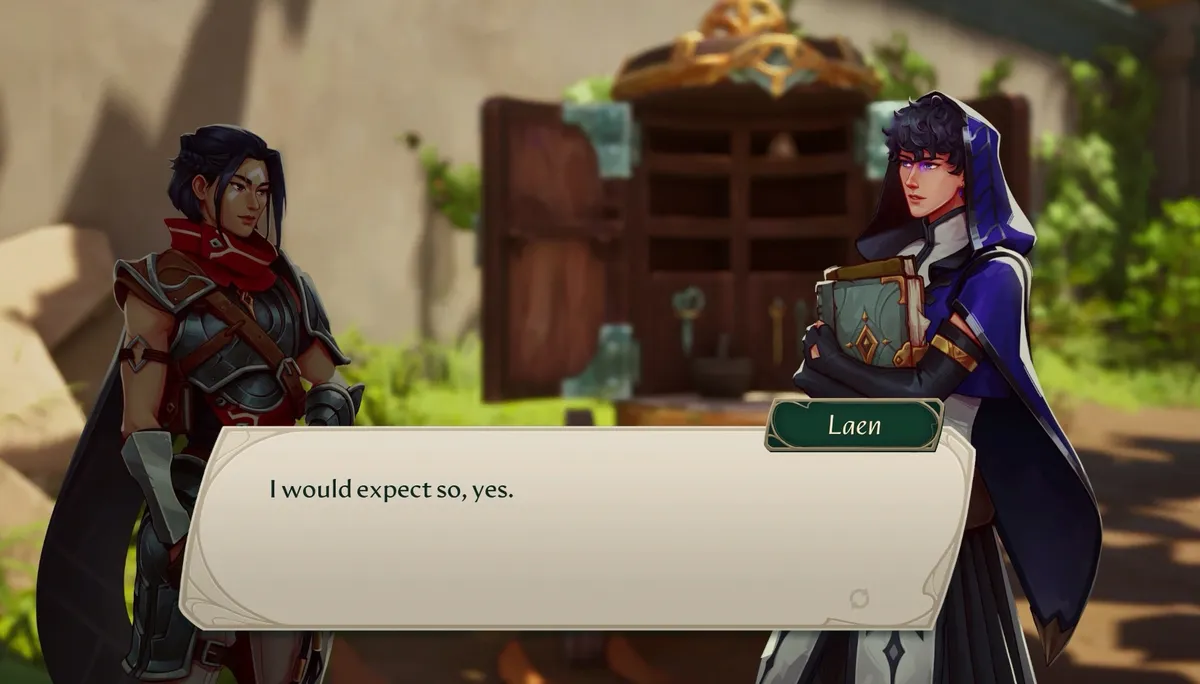
Take Laen, for example, and I'm going to simplify their story for the sake of brevity. They are the group lorekeeper, in charge of compiling information and presenting it back to the group in a digestible format. They come from nobility, but left that life behind because they detested politicking. As such, they do not react well to lying or deceit, because it digs up bad memories from their past. Every character is written with this level of detail and care in mind, and the ways in which they end up clashing with one another due to their personal beliefs and ideals, and how they resolve their disagreements, feels so organic every time. By the end of it all, facing off against their most dangerous for yet, the group all felt like genuine friends, to each other and to me. I had no doubt in my mind that they would die for Brynn, and she for them, in a heartbeat.
This is probably good, because the game’s main thesis is all about cooperation and communication. You and your troupe are strangers in a strange land, so working together is a necessity. On top of that, while Brynn is the one doing the dirty work - scaling giants, collecting resources, following up leads, and so on - all that work would be meaningless without people who can turn that work into something tangible. The gameplay loop is pretty standard: Brynn talks to someone, they request something from her, giving her a list of things to pick up, she does that and brings back the goods, and then that person can finish whatever project they're working on.
It's blindingly straightforward in many ways, but I think what makes it work is context. I did have a realisation at one point that the game is functionally a series of fetch quests, which would normally bore me to tears, but I found that I didn't mind because the stories surrounding them were often so compelling. I'd dig up some old armour blueprints for the blacksmith Sola, which would then turn out to be born from an obscure smithing style almost entirely lost to time, and this turned into a multi-part questline interrogating Sola’s desire to pass this knowledge on to other burgeoning smiths, and how that conflicts with the life of constant travel that she is forced to endure. However, now finding herself in the Enclave, maybe she can finally settle down?
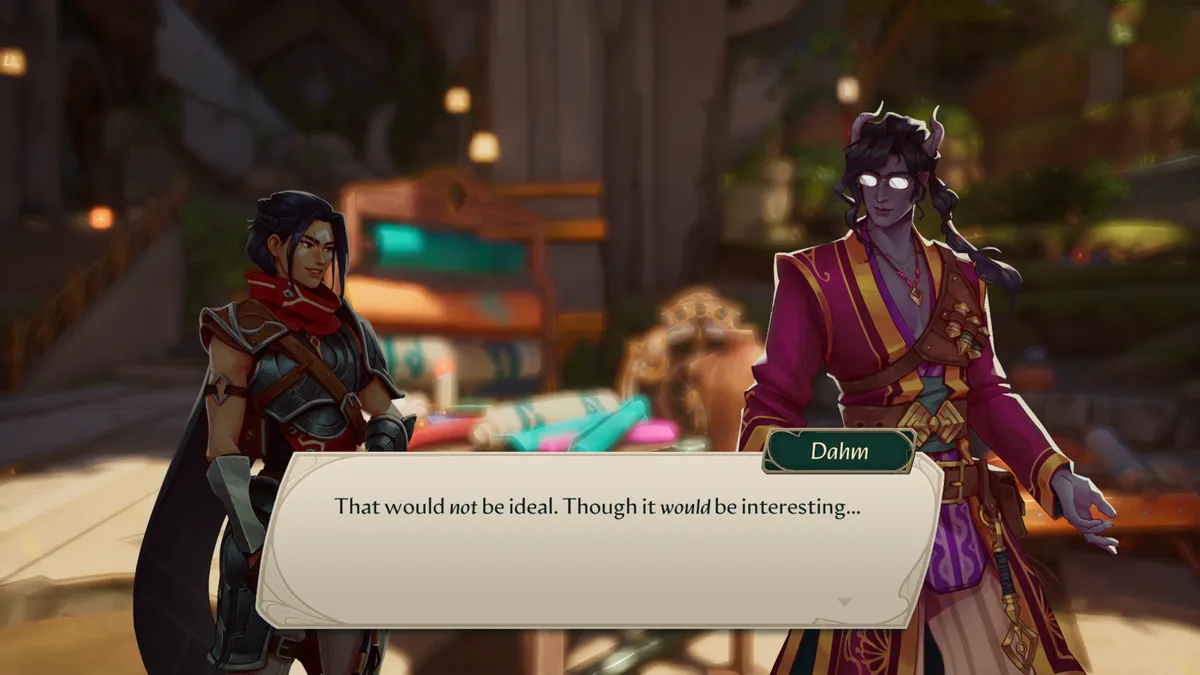
It's really good stuff, and every character has some kind of intricate dilemma to unpack, and I'm perhaps doing it a disservice by simplifying it as I have. The truth is that this game would not stop surprising and delighting me at every turn. Characters are complex and sometimes difficult to parse because their stories keep building in intricacy, and it makes for a more interesting experience overall. Eternal Strands never simply settles on the easy options; it's always shooting for greatness whenever it can, and I love that. It extends to the rest of the game too. The world has elements to consider, and as such, killing enemies with fire will yield different resources than using ice, so if you're looking for something specific, that is part of the puzzle.
Boss fights are designed this way too. I mentioned earlier about harvesting specific resources from them by fulfilling a specific set of criteria during the fight, thus exposing their weak point. The codex explains how to go about this, but you could just figure it out yourself if you've got the patience for it. Personally, I just read up on the solution. Being a sentimental dumbass, I knew that Laen probably worked hard on compiling that information, so it only felt right that I make those efforts worthwhile. It also just adds to the overall sense that you're all a team that helps one another out, and it's a more graceful alternative to the usual pop-up tutorial window games tend to deploy. There's codexes in a lot of games, but very rarely do they feel genuinely important and meaningful in the way Eternal Strands presents it.
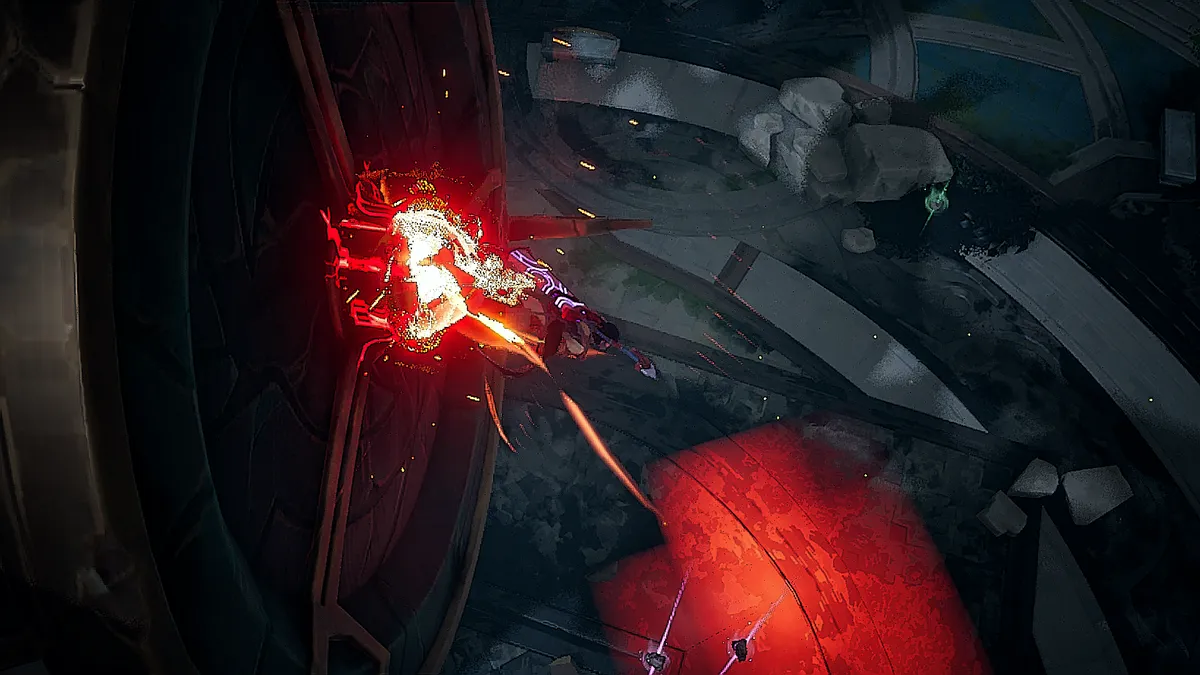
That's just the kind of game this is. I feel connected to these people now, and obligated to help them. Their struggles are my struggles. I think part of that feeling comes from how explicitly tied to queerness their stories are. The game itself is awash with LGBTQIA+ representation, but the text is also written in such a way that feels like it understands the experience deeply. There's a lot of talk about parents, between Laen’s complicated relationship to their family, Oria's quest to understand her father, and a notable father-daughter dynamic who I won't mention because spoilers. You actually have the ability to define Brynn’s relationship with her parents as well, and through the dialogue I chose, she spoke about often disagreeing with her mother, but understanding that, despite everything, their love for one another is undeniable.
Relationships with parents are difficult that way, much more so if you've ever had difficulty coming out to them. Something Brynn says while consoling another character got me good. She says that standing up to a parent after years of subservience is one of the most difficult things a person can do, so difficult that many people simply never do in their lifetimes, but it is necessary. It sucks, you'll hate it in the moment, but you need, more than anything else in the world, to trust in yourself, and that takes bravery.
Ugh. If that isn't the wise words of someone who gets it, I don't know what would be. I'm a bit too old now to be attaching my entire self worth to a video game, but it's nice to be reminded of these things now and again.
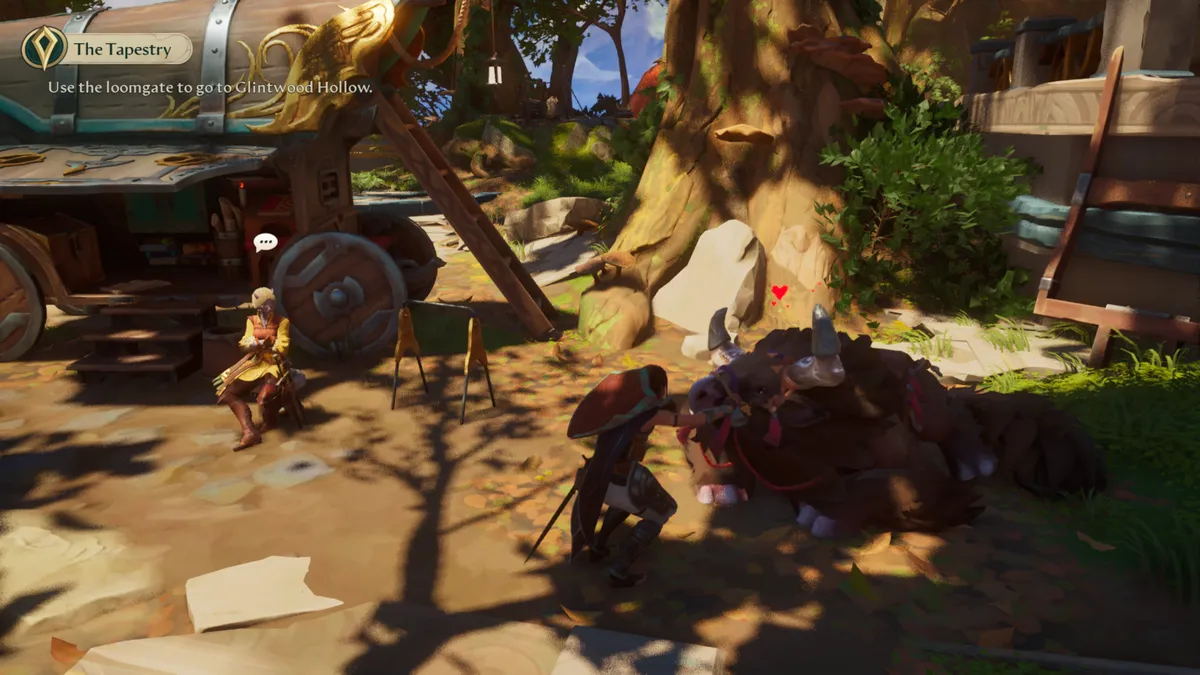
I think Eternal Strands feels especially convincing in its portrayal of this, because the group you find yourself a part of is a collection of misfits from all sorts of places, who found solidarity in their shared isolation from society. Personal dilemmas and interventions are handled not with accusations or demands, but met with empathy and patience. Like I said, trusting yourself and your judgement should be your main priority, but the game also notes the importance of having people around you kind enough to listen, and lend a helping hand if they can. There's a balance to be found there. I'm still doing my best to find it, personally, and maybe I never entirely will, but I can rest easier with the knowledge that every day I get closer to that end.
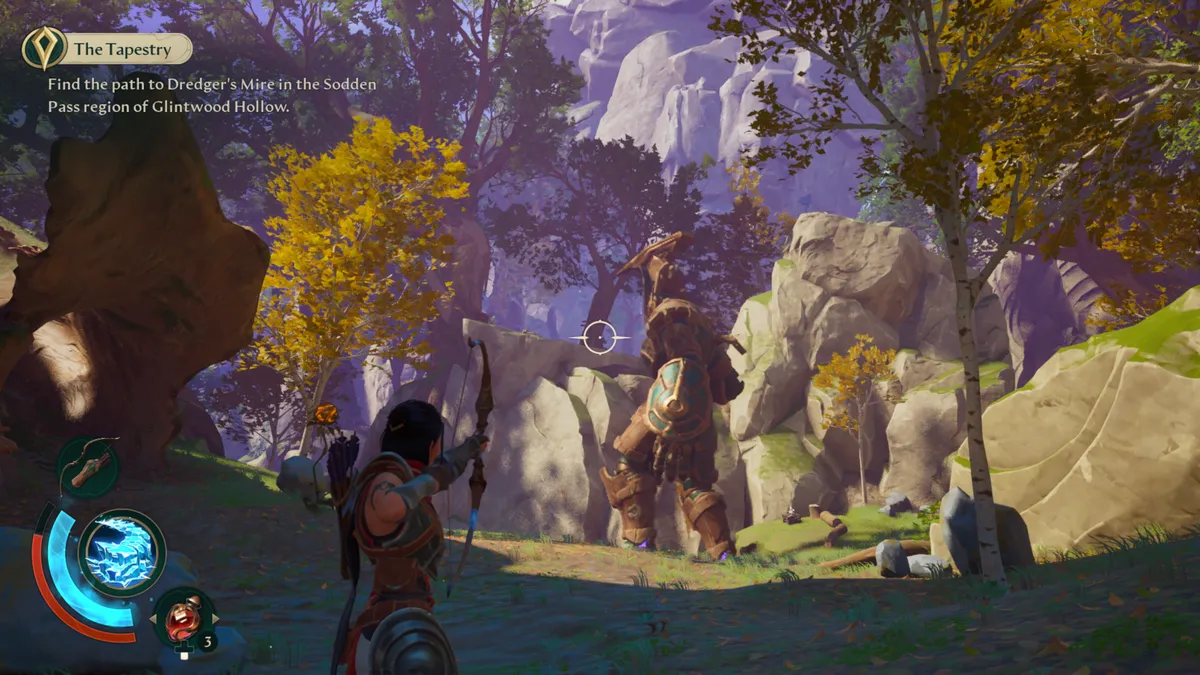
I realise in hindsight that I haven't spoken much about the actual gameplay in Eternal Strands, and I hope that isn't suggesting I didn't like it. On the contrary, I had a blast with this game. It's an extremely fun, light-hearted action romp in various gorgeous locales. I liked playing this game a lot, but I should stress that those expeditions into the Enclave would not have been so absorbing were it not for the context which brought me to it. Narrative and gameplay are closely tied to one another, and that's what made it so addictive.
But then, the game also knows when to forego its usual sandbox-y bombast, in favour of something more subdued. Eternal Strands is a game made by a small team who went through some trouble to get the project out the door. It was originally backed by Take Two publishing label Private Division, but in 2024 decided to move away from their dealings and into self-publishing. This is, of course, a huge risk, but the heads of the studio stated that the reason for the switch was a case of wanting total autonomy in their creative output. As such, the game is basically out in the cold, relying on word of mouth and good favour to see success. Were it not for a handful of positive reviews and day one availability on Game Pass, I likely would not have given it a second thought. I thankfully played and adored it, and I bet there are so many people like me just waiting for a game like this to enter their life.
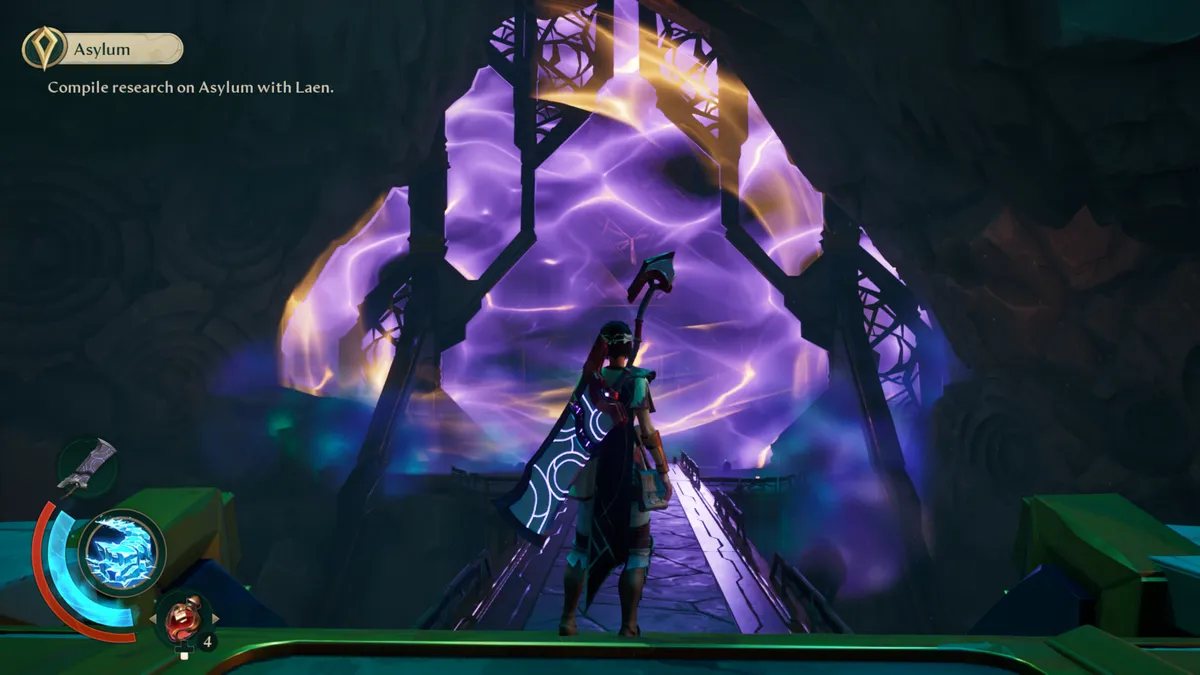
There's a side mission near the end of the game that exemplifies what I think is the true driving force behind Eternal Strands. I'll leave the details out for fear of spoiling a beautiful sequence, but it's the conclusion to a character’s questline. You travel to an area that has no enemies or collectibles. It's just a peaceful farm, situated in a valley that stretches out for miles.
You walk around, and hear about the story of the person who lived there, and the incredible things they did. They aren't a hero from the history books; just a kindly farmer who, through years of labour and strife, helped save hundreds, if not thousands, of lives. The sequence itself takes maybe 10 minutes, if not less. It also, notably, could have been summarised in a few paragraphs back at base camp. That's not what this is, though. Yellow Brick Games went out of their way to create this beautiful, bespoke area, just so this one character could experience closure.
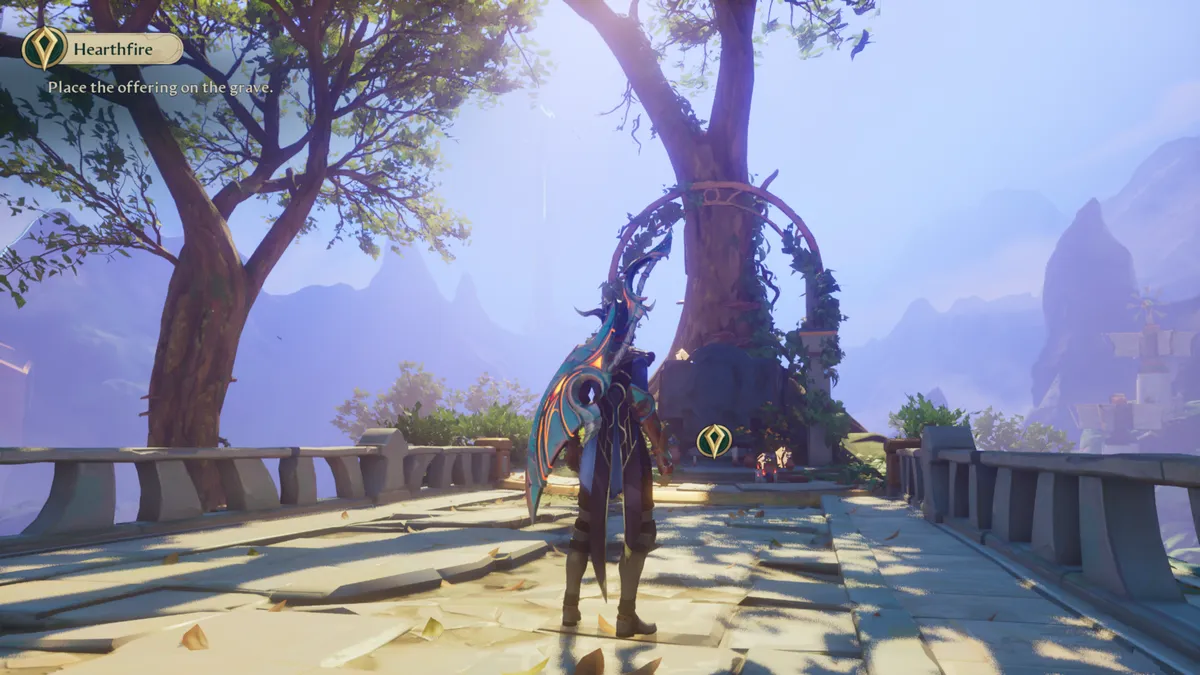
It is insane how much I think about this farm, days after concluding my time with the game. It is the moment I remember most fondly. It also speaks to the priorities of Yellow Brick Games that it exists at all. The game’s credits make a point of listing the team not in order of perceived importance, but instead by surname. No one person is held above another. They worked together to bring this lovely game to life, and that is reflected in how they present themselves. It's the kind of humility I love to see in creatives, especially in video games. They are a labour of love, born from a collective effort to realise a shared vision. Considering how many fingers are in almost every video game pie that gets baked, it's a miracle the whole thing doesn't catch fire more often.
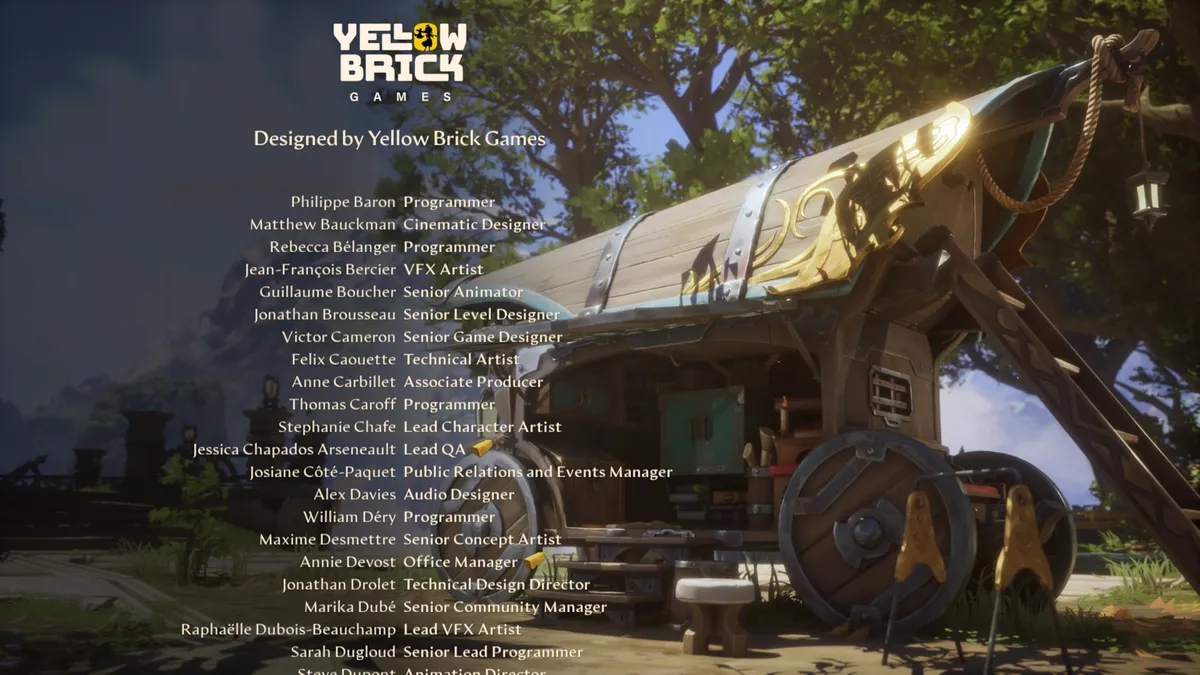
Yellow Brick Games seem to me like a studio that practices what it preaches, and in an intensely hostile industry such as this one, that is refreshing to see. I wish the entire development team the absolute best fortune in the world, and I sincerely hope that we get to see more from the Enclave and its lovable inhabitants. In the meantime, I'll be boosting this game to everyone I can think of because it is wonderful. Including you, the person reading this! If you haven't played Eternal Strands, play it! It's so good!! Raaaaaaaggghhh!!!
